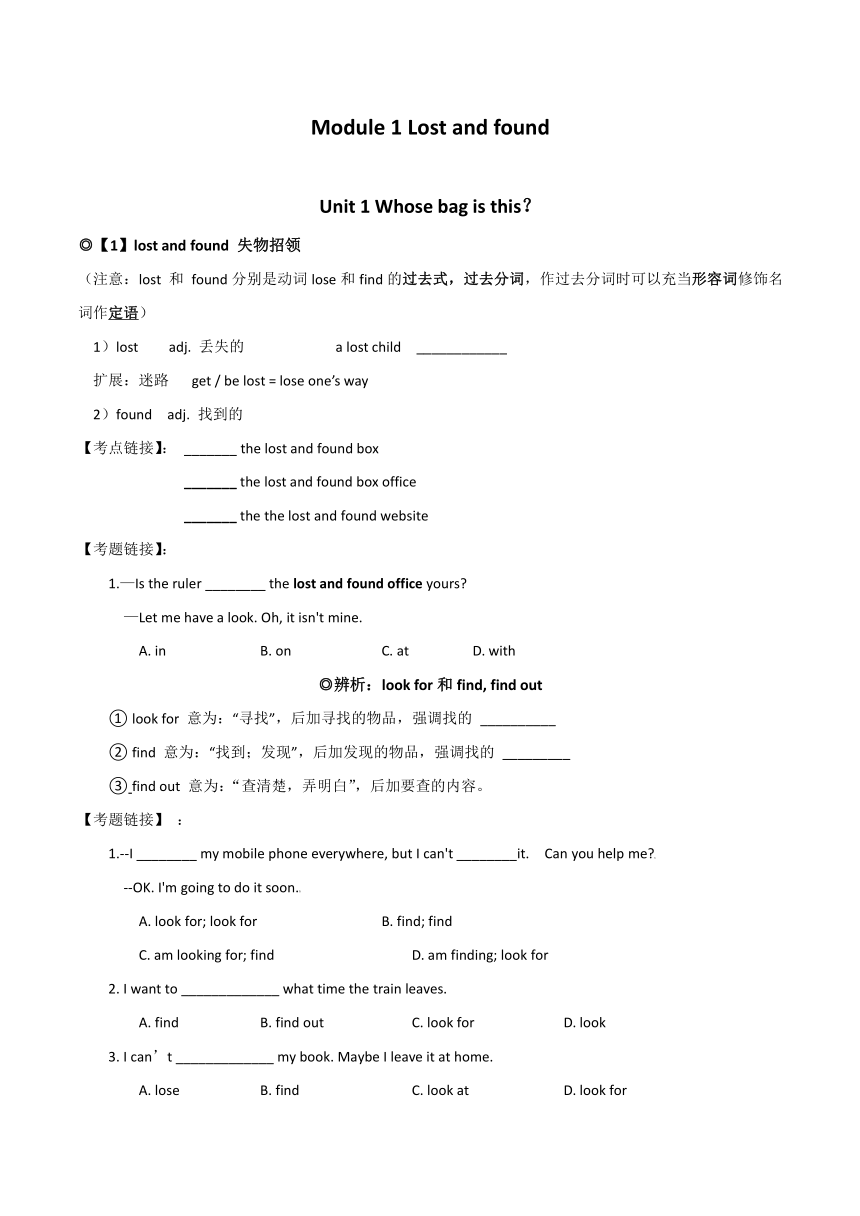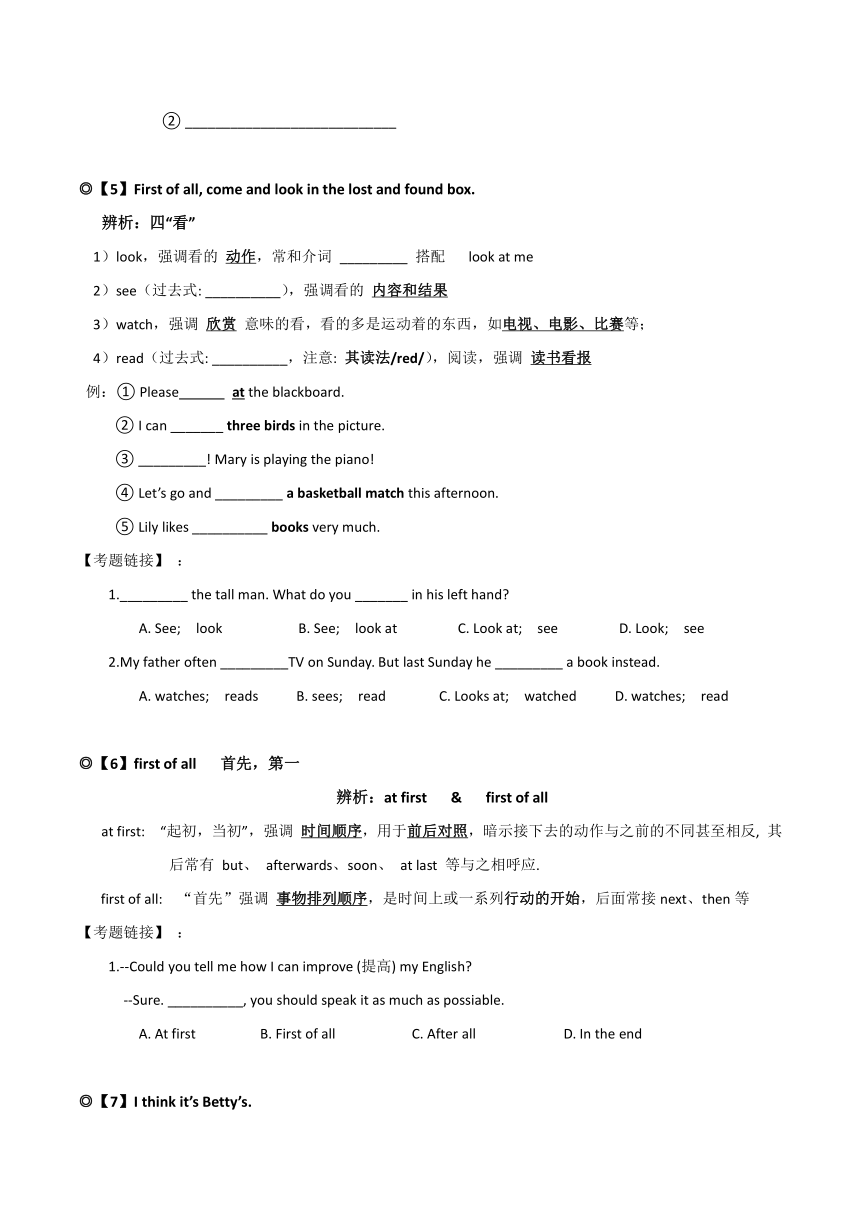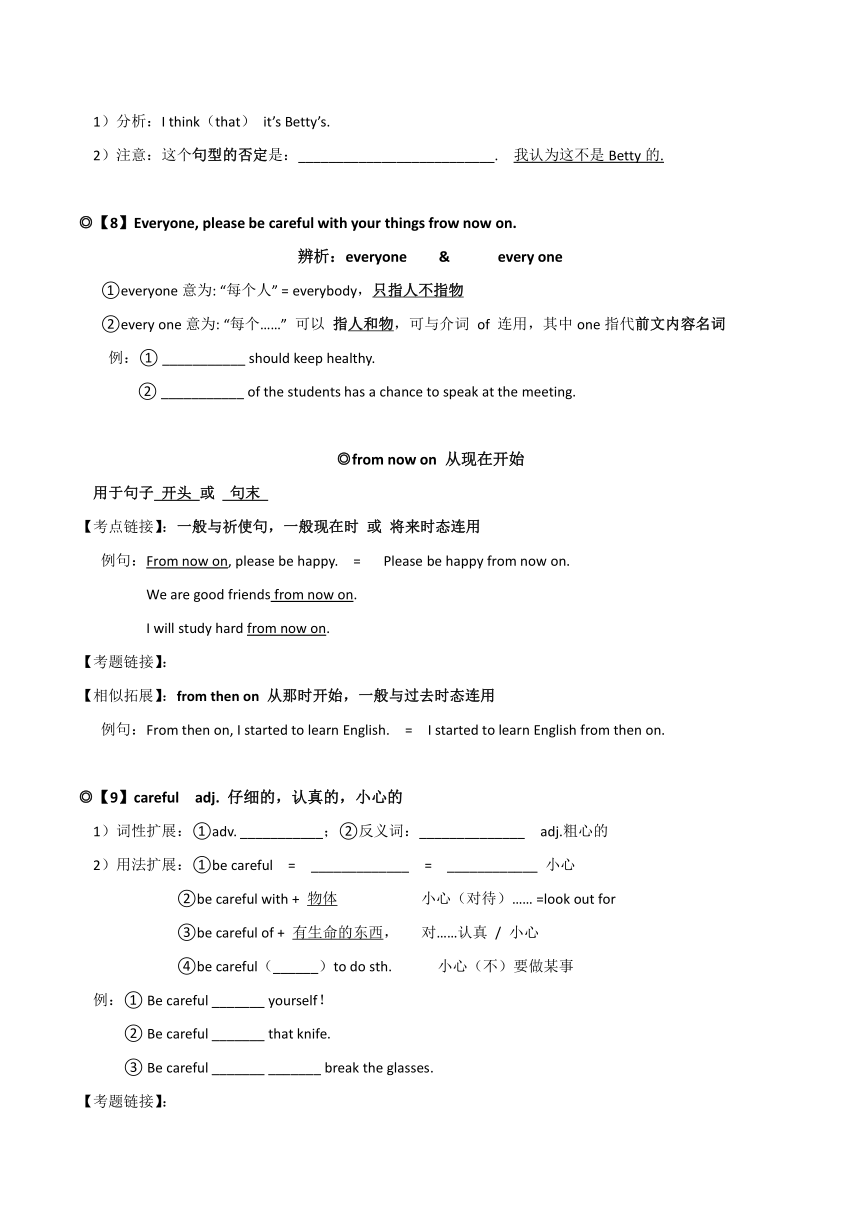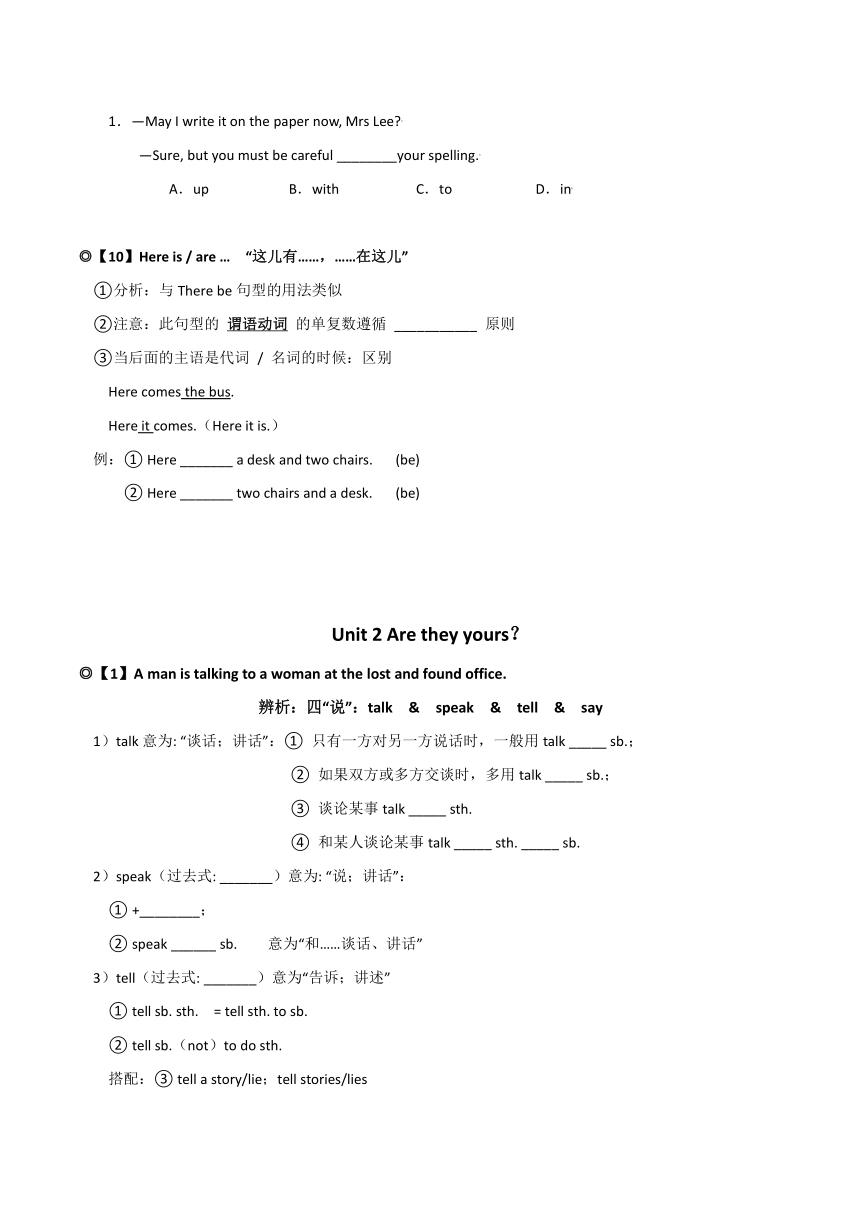外研(新标准)版七年级下册Module 1 Lost and found培优讲义 (无答案)
文档属性
| 名称 | 外研(新标准)版七年级下册Module 1 Lost and found培优讲义 (无答案) |

|
|
| 格式 | docx | ||
| 文件大小 | 92.7KB | ||
| 资源类型 | 教案 | ||
| 版本资源 | 外研版 | ||
| 科目 | 英语 | ||
| 更新时间 | 2024-06-07 07:50:36 | ||
图片预览





文档简介
Module 1 Lost and found
Unit 1 Whose bag is this?
◎【1】lost and found 失物招领
(注意:lost 和 found分别是动词lose和find的过去式,过去分词,作过去分词时可以充当形容词修饰名词作定语)
1)lost adj. 丢失的 a lost child ____________
扩展:迷路 get / be lost = lose one’s way
2)found adj. 找到的
【考点链接】: _______ the lost and found box
_______ the lost and found box office
_______ the the lost and found website
【考题链接】:
1.—Is the ruler ________ the lost and found office yours
—Let me have a look. Oh, it isn't mine.
A. in B. on C. at D. with
◎辨析:look for和find, find out
① look for 意为:“寻找”,后加寻找的物品,强调找的 __________
② find 意为:“找到;发现”,后加发现的物品,强调找的 _________
③ find out 意为:“查清楚,弄明白”,后加要查的内容。
【考题链接】 :
1.--I ________ my mobile phone everywhere, but I can't ________it. Can you help me
--OK. I'm going to do it soon.
A. look for; look for B. find; find
C. am looking for; find D. am finding; look for
2. I want to _____________ what time the train leaves.
A. find B. find out C. look for D. look
3. I can’t _____________ my book. Maybe I leave it at home.
A. lose B. find C. look at D. look for
◎【2】Welcome back to + 地点名词 欢迎回到...
1)Welcome to + 表示地点的名词 欢迎来到某地
eg. 欢迎来到北京: _____________________________
2)Welcome + 表示地点的副词 (注意:前面的介词to要省略)
想一想地点副词有哪些? ____________________________
eg. 欢迎回家: _______________________________
◎【3】a lot of = ___________ = _____________
许多 后 + _______________ 或 ______________,表示数量
辨析:a lot =____________, 一般放句末,“非常,很”,是 ___________ 短语,表示程度
例:① There are_____________flowers in spring.
② I love flowers_____________.
【考题链接】 :
1. There _________ water on the road in the afternoon.
A. are lots of B. are a lot C. is a lot of D. is a lot
◎【4】whose 谁的
1)分析:whose是 __________ 的所有格形式,是对___________ 及 ___________(不含of构成的所有格)提问的特殊疑问词:
注意:’s名词所有格可相当于名词性物主代词
例:① His bike is so cool. -- __________ bike is so cool?
② The shirt is mine. -- _________ is the shirt?
③ Tom’s mother is a good teacher. -- __________ mother is a good teacher
2)Whose的两种提问方式:同义替换
例:This is Betty’s gloves. (对划线部分提问)
① Whose gloves is this
② Whose is this gloves
【针对练习】:Those are my father’s ties. (对划线部分提问)
① ____________________________
② ____________________________
◎【5】First of all, come and look in the lost and found box.
辨析:四“看”
1)look,强调看的 动作,常和介词 _________ 搭配 look at me
2)see(过去式: __________),强调看的 内容和结果
3)watch,强调 欣赏 意味的看,看的多是运动着的东西,如电视、电影、比赛等;
4)read(过去式: __________,注意: 其读法/red/),阅读,强调 读书看报
例:① Please at the blackboard.
② I can _______ three birds in the picture.
③ _________! Mary is playing the piano!
④ Let’s go and _________ a basketball match this afternoon.
⑤ Lily likes __________ books very much.
【考题链接】 :
1._________ the tall man. What do you _______ in his left hand
A. See; look B. See; look at C. Look at; see D. Look; see
2.My father often _________TV on Sunday. But last Sunday he _________ a book instead.
A. watches; reads B. sees; read C. Looks at; watched D. watches; read
◎【6】first of all 首先,第一
辨析:at first & first of all
at first: “起初,当初”,强调 时间顺序,用于前后对照,暗示接下去的动作与之前的不同甚至相反, 其
后常有 but、 afterwards、soon、 at last 等与之相呼应.
first of all: “首先”强调 事物排列顺序,是时间上或一系列行动的开始,后面常接next、then等
【考题链接】 :
1.--Could you tell me how I can improve (提高) my English
--Sure. __________, you should speak it as much as possiable.
A. At first B. First of all C. After all D. In the end
◎【7】I think it’s Betty’s.
1)分析:I think(that) it’s Betty’s.
2)注意:这个句型的否定是:__________________________. 我认为这不是Betty的.
◎【8】Everyone, please be careful with your things frow now on.
辨析:everyone & every one
①everyone意为: “每个人” = everybody,只指人不指物
②every one意为: “每个……” 可以 指人和物,可与介词 of 连用,其中one指代前文内容名词
例:① ___________ should keep healthy.
② ___________ of the students has a chance to speak at the meeting.
◎from now on 从现在开始
用于句子 开头 或 句末
【考点链接】:一般与祈使句,一般现在时 或 将来时态连用
例句:From now on, please be happy. = Please be happy from now on.
We are good friends from now on.
I will study hard from now on.
【考题链接】:
【相似拓展】:from then on 从那时开始,一般与过去时态连用
例句:From then on, I started to learn English. = I started to learn English from then on.
◎【9】careful adj. 仔细的,认真的,小心的
1)词性扩展:①adv. ___________;②反义词:______________ adj.粗心的
2)用法扩展:①be careful = _____________ = ____________ 小心
②be careful with + 物体 小心(对待)…… =look out for
③be careful of + 有生命的东西, 对……认真 / 小心
④be careful(______)to do sth. 小心(不)要做某事
例:① Be careful _______ yourself!
② Be careful _______ that knife.
③ Be careful _______ _______ break the glasses.
【考题链接】:
1.—May I write it on the paper now, Mrs Lee
—Sure, but you must be careful ________your spelling.
A.up B.with C.to D.in
◎【10】Here is / are … “这儿有……,……在这儿”
①分析:与There be句型的用法类似
②注意:此句型的 谓语动词 的单复数遵循 ___________ 原则
③当后面的主语是代词 / 名词的时候:区别
Here comes the bus.
Here it comes.(Here it is.)
例:① Here _______ a desk and two chairs. (be)
② Here _______ two chairs and a desk. (be)
Unit 2 Are they yours?
◎【1】A man is talking to a woman at the lost and found office.
辨析:四“说”:talk & speak & tell & say
1)talk意为: “谈话;讲话”:① 只有一方对另一方说话时,一般用talk _____ sb.;
② 如果双方或多方交谈时,多用talk _____ sb.;
③ 谈论某事talk _____ sth.
④ 和某人谈论某事talk _____ sth. _____ sb.
2)speak(过去式: _______)意为: “说;讲话”:
① +________;
② speak ______ sb. 意为“和……谈话、讲话”
3)tell(过去式: _______)意为“告诉;讲述”
① tell sb. sth. = tell sth. to sb.
② tell sb.(not)to do sth.
搭配:③ tell a story/lie;tell stories/lies
4)say (过去式: _________)意为“说”:
① +____________;
② 对某人说某事say sth. _________ sb.
③ say (that) + 句子
【考题链接】:
1. The teacher _____________ a story to the boy every day.
A. tells B. says C. speaks D. talks
2. The boy ______ that he can ________ French.
A. says; talk B. says; speak C. talks; say D. speak; say
3. —Jim, can you this word in Chinese
—Yes, I can a little Chinese.
A.speak; say B.say; speak C.tell; speak D.talk; say
◎【2】or : ①和…用于 否定 句中); ②或者; ③否则
例: ① I don’t like bananas and apples. ( )
I don’t like bananas or apples. ( )
② --Do you like apples or bananas
-- I like apples. (不能用Yes / No来回答)
③ Hurry up,or you’ll be late for school.
◎【3】They are in a hurry. 匆匆忙忙地
词性扩展: ① hurry up (动词): 赶快,赶紧
同义句转换:② hurry to + 地点 = go to + 地点 + in a hurry 匆忙去某地
例:她匆匆忙忙去了车站。
She hurried to the bus stop. = ____________________________________.
◎【4】They leave things on planes.
leave 离开;遗留(过去式left)
1)leave A for B :离开A地去B地;
leave for + 目的地点 动身去……
例:我要离开合肥去北京了:___________________________________.
我要去北京了:____________________________.
2)辨析:forget & leave
leave sth. + 地点 把……落在某地 强调遗忘物品 “所在的地点(忘在哪)”
forget + sth. 不加地点 忘记(过去式forgot) 强调遗忘的 “对象和内容(忘了啥)”
【考点拓展】:forget to do sth. ________________; forget doing sth. __________________
【考题链接】:
1.I can’t do my homework now, I _______ it in the classroom this morning.
A.leave B.forget C.left D.forgot
2. Don't your homework at home. Bring it here tomorrow.
A. forget B. remember C. leave D. left
3.Don’t forget __________ the door when you leave the classroom.
A.closed B.close C. to close D.closing
◎【5】That’s why there are lost and found offices at airports and stations.
【写作句式】:
That’s why + 结果 那就是…的原因(上文里有情景原因)
That’s because + 原因 那就是因为…(上文里有情景结果)
例:① He always tells lies. That’s why I don’t like him.
原因 结果
② I was late for school this morning. That’s because I got up late.
结果 原因
【考题链接】:
1.Lucy is an interesting girl. That’s they all like her.
A.when B.what C.why D.where
2.Uncle Wang's home is far away from the factory. _________ he always gets up early.
A. That's because B. That's why C. That's when D. That's what
3.Uncle Wang is the first one to come to work. _________ he always gets up early.
A. That's because B. That's why C. That's when D. That's what
◎【6】on planes, on trains, on buses, in taxis
1)思考:为什么坐不同的交通工具用的介词不同?
______ cars, ______ subway
2)扩展:同义句转换:
①乘坐某交通工具(taxi,bus,boat,plane,train…)去某地
take a + 交通工具 to + 地点 = go to + 地点 + by 交通工具
例句:I often _________ _______ taxi to school. = I often go to school _______ taxi.
②开车去某地:drive(过去式drove) to + 地点 。
③坐飞机去某地:fly(过去式flew)to + 地点 。
④步行去某地:walk to + 地点 = go to + 地点 + on foot.
◎【7】Hundreds of people come here every day. 成百上千的人来这里。
1)数字+ hundred... 确切的数(不加s和of)
例如:five hundred, three hundred and thirteen
2)hundreds of... 不确切的数(s和of同时加,前面不能带确切的数字)
例如:判断下列用法正误
five hundred of... ( )
five hundreds of;... ( )
five hundreds... ( )
【考点联想】:同用法词汇thousand,million,billion,dozen
【考题链接】:
1.--Who can read the number 10,206 in English
--Let me try. That’s___________.
A.one zero two zero and six B.ten thousand, two hundred, six
C.ten thousand and two hundred and six D.ten thousand, two hundred and six
2.—How many people come to the New York City Lost and Found Office every week
—________people come here.
A.Six hundreds B.Six hundred of
C.Hundreds of D.Six hundreds of
3. There are about ________animals on the big zoo.
A. ten hundreds of B. ten hundreds
C. ten hundred D. hundreds of
◎辨析:every day和everyday
① every day :“每天,天天”,是副词词组,在句子中一般放在句末,作状语。
② everyday : “日常的,每天的”,是个形容词,在句子中作定语,后加名词。
例:①We speak English ______________.
②Let’s learn some _____________ English.
◎【8】at the/ this moment= now: 此时此刻 + 现在进行时 (一般放句子末尾时间状语)
例:我们此刻在上一节英语课。
______________________________________.
【联想扩展】:
at that moment: 在那时 + 过去进行时
例:我们那时在上一节英语课。
______________________________________.
◎【9】Are you looking for fifteen kilos of sausages
公式:基数词 + 单位词 + of + 可数名词复数 / 不可数名词
例:① a pair of shoes / two pairs of shoes
② a box of apples / ten boxes of apples
【考点联想】:
单位词:例如:cup, bottle, box, basket, kilo, pair...
它们一起做主语的时候,后面的“动词”要根据“单位词”的单复数变化一致。
【考题链接】:
1.Ten cups of tea _________ enough for them. (be)
2.There _______ a box of apples on the table. (be)
3.Are you looking for______________
A. fifteen kilos pear B. fifteen kilos of pear
C. fifteen kilo pears D. fifteen kilos of peard
◎【10】They are here too!
◎辨析:四“也”: either, too, also, as well
1)also 位于肯定句句中,即位于be动词、助动词、情态动词后,实义动词前
例:①他也是一个学生。_________________________.
②他也会游泳。___________________________.
③他也想去那里。_________________________________.
2)too 位于肯定句句末,前常可以加逗号隔开
例:他也会游泳。______________________.
3)as well 位于肯定句句末,前不加逗号隔开
例:他也会游泳。__________________________.
4)either 也不: 否定句句末
例:他也不喜欢跑步。_______________________________.
【考题链接】:
1.John ________ thinks bears sleep all through the winter ________.
A. also; either B. too; as well C. also; as well D. as well; too
2.Lily doesn’t like milk. I don’t like it, ________.
A. also B. too C. also D. either
◎【11】Call Tony at 8547 9362.
① 打电话: call sb. at + 电话号码 用某号码打电话给某人
② 称呼:You can call me Louie. 你可以叫我Louie。
【拓展链接】:call on + 人: 拜访某人
call at + 地点: 拜访某地
Unit 3 Language in use
◎【1】辨析:such as 和 for example
①同:都有 “例如” 的意思
②异:such as + 多个小例子 = like (举例一般是名词);
for example + 一个具体例子, (一般用逗号隔开)
【考题链接】:
例:①I like some sports, _____________ swimming and basketball.
②________________, swimming is a wonderful sport.
◎【2】They can help you find them.
●动词:帮助:
① help sb. to do sth.(to可省略) 帮助某人做某事 = help sb. with sth.
同义句转换:
Mike often helps me finish my homework. = ________________________________________.
●名词:帮助
【拓展链接】:
② with the help of... 在……的帮助下;
ask for sb’s help 请求某人的帮助
【写作句式】:
With the help of his mom, he finishes his homework earlier.
With the help of the police, they found their child.
With the help of my dad, I learn to ride a bike.
仿写:
________________________________________________.
Unit 1 Whose bag is this?
◎【1】lost and found 失物招领
(注意:lost 和 found分别是动词lose和find的过去式,过去分词,作过去分词时可以充当形容词修饰名词作定语)
1)lost adj. 丢失的 a lost child ____________
扩展:迷路 get / be lost = lose one’s way
2)found adj. 找到的
【考点链接】: _______ the lost and found box
_______ the lost and found box office
_______ the the lost and found website
【考题链接】:
1.—Is the ruler ________ the lost and found office yours
—Let me have a look. Oh, it isn't mine.
A. in B. on C. at D. with
◎辨析:look for和find, find out
① look for 意为:“寻找”,后加寻找的物品,强调找的 __________
② find 意为:“找到;发现”,后加发现的物品,强调找的 _________
③ find out 意为:“查清楚,弄明白”,后加要查的内容。
【考题链接】 :
1.--I ________ my mobile phone everywhere, but I can't ________it. Can you help me
--OK. I'm going to do it soon.
A. look for; look for B. find; find
C. am looking for; find D. am finding; look for
2. I want to _____________ what time the train leaves.
A. find B. find out C. look for D. look
3. I can’t _____________ my book. Maybe I leave it at home.
A. lose B. find C. look at D. look for
◎【2】Welcome back to + 地点名词 欢迎回到...
1)Welcome to + 表示地点的名词 欢迎来到某地
eg. 欢迎来到北京: _____________________________
2)Welcome + 表示地点的副词 (注意:前面的介词to要省略)
想一想地点副词有哪些? ____________________________
eg. 欢迎回家: _______________________________
◎【3】a lot of = ___________ = _____________
许多 后 + _______________ 或 ______________,表示数量
辨析:a lot =____________, 一般放句末,“非常,很”,是 ___________ 短语,表示程度
例:① There are_____________flowers in spring.
② I love flowers_____________.
【考题链接】 :
1. There _________ water on the road in the afternoon.
A. are lots of B. are a lot C. is a lot of D. is a lot
◎【4】whose 谁的
1)分析:whose是 __________ 的所有格形式,是对___________ 及 ___________(不含of构成的所有格)提问的特殊疑问词:
注意:’s名词所有格可相当于名词性物主代词
例:① His bike is so cool. -- __________ bike is so cool?
② The shirt is mine. -- _________ is the shirt?
③ Tom’s mother is a good teacher. -- __________ mother is a good teacher
2)Whose的两种提问方式:同义替换
例:This is Betty’s gloves. (对划线部分提问)
① Whose gloves is this
② Whose is this gloves
【针对练习】:Those are my father’s ties. (对划线部分提问)
① ____________________________
② ____________________________
◎【5】First of all, come and look in the lost and found box.
辨析:四“看”
1)look,强调看的 动作,常和介词 _________ 搭配 look at me
2)see(过去式: __________),强调看的 内容和结果
3)watch,强调 欣赏 意味的看,看的多是运动着的东西,如电视、电影、比赛等;
4)read(过去式: __________,注意: 其读法/red/),阅读,强调 读书看报
例:① Please at the blackboard.
② I can _______ three birds in the picture.
③ _________! Mary is playing the piano!
④ Let’s go and _________ a basketball match this afternoon.
⑤ Lily likes __________ books very much.
【考题链接】 :
1._________ the tall man. What do you _______ in his left hand
A. See; look B. See; look at C. Look at; see D. Look; see
2.My father often _________TV on Sunday. But last Sunday he _________ a book instead.
A. watches; reads B. sees; read C. Looks at; watched D. watches; read
◎【6】first of all 首先,第一
辨析:at first & first of all
at first: “起初,当初”,强调 时间顺序,用于前后对照,暗示接下去的动作与之前的不同甚至相反, 其
后常有 but、 afterwards、soon、 at last 等与之相呼应.
first of all: “首先”强调 事物排列顺序,是时间上或一系列行动的开始,后面常接next、then等
【考题链接】 :
1.--Could you tell me how I can improve (提高) my English
--Sure. __________, you should speak it as much as possiable.
A. At first B. First of all C. After all D. In the end
◎【7】I think it’s Betty’s.
1)分析:I think(that) it’s Betty’s.
2)注意:这个句型的否定是:__________________________. 我认为这不是Betty的.
◎【8】Everyone, please be careful with your things frow now on.
辨析:everyone & every one
①everyone意为: “每个人” = everybody,只指人不指物
②every one意为: “每个……” 可以 指人和物,可与介词 of 连用,其中one指代前文内容名词
例:① ___________ should keep healthy.
② ___________ of the students has a chance to speak at the meeting.
◎from now on 从现在开始
用于句子 开头 或 句末
【考点链接】:一般与祈使句,一般现在时 或 将来时态连用
例句:From now on, please be happy. = Please be happy from now on.
We are good friends from now on.
I will study hard from now on.
【考题链接】:
【相似拓展】:from then on 从那时开始,一般与过去时态连用
例句:From then on, I started to learn English. = I started to learn English from then on.
◎【9】careful adj. 仔细的,认真的,小心的
1)词性扩展:①adv. ___________;②反义词:______________ adj.粗心的
2)用法扩展:①be careful = _____________ = ____________ 小心
②be careful with + 物体 小心(对待)…… =look out for
③be careful of + 有生命的东西, 对……认真 / 小心
④be careful(______)to do sth. 小心(不)要做某事
例:① Be careful _______ yourself!
② Be careful _______ that knife.
③ Be careful _______ _______ break the glasses.
【考题链接】:
1.—May I write it on the paper now, Mrs Lee
—Sure, but you must be careful ________your spelling.
A.up B.with C.to D.in
◎【10】Here is / are … “这儿有……,……在这儿”
①分析:与There be句型的用法类似
②注意:此句型的 谓语动词 的单复数遵循 ___________ 原则
③当后面的主语是代词 / 名词的时候:区别
Here comes the bus.
Here it comes.(Here it is.)
例:① Here _______ a desk and two chairs. (be)
② Here _______ two chairs and a desk. (be)
Unit 2 Are they yours?
◎【1】A man is talking to a woman at the lost and found office.
辨析:四“说”:talk & speak & tell & say
1)talk意为: “谈话;讲话”:① 只有一方对另一方说话时,一般用talk _____ sb.;
② 如果双方或多方交谈时,多用talk _____ sb.;
③ 谈论某事talk _____ sth.
④ 和某人谈论某事talk _____ sth. _____ sb.
2)speak(过去式: _______)意为: “说;讲话”:
① +________;
② speak ______ sb. 意为“和……谈话、讲话”
3)tell(过去式: _______)意为“告诉;讲述”
① tell sb. sth. = tell sth. to sb.
② tell sb.(not)to do sth.
搭配:③ tell a story/lie;tell stories/lies
4)say (过去式: _________)意为“说”:
① +____________;
② 对某人说某事say sth. _________ sb.
③ say (that) + 句子
【考题链接】:
1. The teacher _____________ a story to the boy every day.
A. tells B. says C. speaks D. talks
2. The boy ______ that he can ________ French.
A. says; talk B. says; speak C. talks; say D. speak; say
3. —Jim, can you this word in Chinese
—Yes, I can a little Chinese.
A.speak; say B.say; speak C.tell; speak D.talk; say
◎【2】or : ①和…用于 否定 句中); ②或者; ③否则
例: ① I don’t like bananas and apples. ( )
I don’t like bananas or apples. ( )
② --Do you like apples or bananas
-- I like apples. (不能用Yes / No来回答)
③ Hurry up,or you’ll be late for school.
◎【3】They are in a hurry. 匆匆忙忙地
词性扩展: ① hurry up (动词): 赶快,赶紧
同义句转换:② hurry to + 地点 = go to + 地点 + in a hurry 匆忙去某地
例:她匆匆忙忙去了车站。
She hurried to the bus stop. = ____________________________________.
◎【4】They leave things on planes.
leave 离开;遗留(过去式left)
1)leave A for B :离开A地去B地;
leave for + 目的地点 动身去……
例:我要离开合肥去北京了:___________________________________.
我要去北京了:____________________________.
2)辨析:forget & leave
leave sth. + 地点 把……落在某地 强调遗忘物品 “所在的地点(忘在哪)”
forget + sth. 不加地点 忘记(过去式forgot) 强调遗忘的 “对象和内容(忘了啥)”
【考点拓展】:forget to do sth. ________________; forget doing sth. __________________
【考题链接】:
1.I can’t do my homework now, I _______ it in the classroom this morning.
A.leave B.forget C.left D.forgot
2. Don't your homework at home. Bring it here tomorrow.
A. forget B. remember C. leave D. left
3.Don’t forget __________ the door when you leave the classroom.
A.closed B.close C. to close D.closing
◎【5】That’s why there are lost and found offices at airports and stations.
【写作句式】:
That’s why + 结果 那就是…的原因(上文里有情景原因)
That’s because + 原因 那就是因为…(上文里有情景结果)
例:① He always tells lies. That’s why I don’t like him.
原因 结果
② I was late for school this morning. That’s because I got up late.
结果 原因
【考题链接】:
1.Lucy is an interesting girl. That’s they all like her.
A.when B.what C.why D.where
2.Uncle Wang's home is far away from the factory. _________ he always gets up early.
A. That's because B. That's why C. That's when D. That's what
3.Uncle Wang is the first one to come to work. _________ he always gets up early.
A. That's because B. That's why C. That's when D. That's what
◎【6】on planes, on trains, on buses, in taxis
1)思考:为什么坐不同的交通工具用的介词不同?
______ cars, ______ subway
2)扩展:同义句转换:
①乘坐某交通工具(taxi,bus,boat,plane,train…)去某地
take a + 交通工具 to + 地点 = go to + 地点 + by 交通工具
例句:I often _________ _______ taxi to school. = I often go to school _______ taxi.
②开车去某地:drive(过去式drove) to + 地点 。
③坐飞机去某地:fly(过去式flew)to + 地点 。
④步行去某地:walk to + 地点 = go to + 地点 + on foot.
◎【7】Hundreds of people come here every day. 成百上千的人来这里。
1)数字+ hundred... 确切的数(不加s和of)
例如:five hundred, three hundred and thirteen
2)hundreds of... 不确切的数(s和of同时加,前面不能带确切的数字)
例如:判断下列用法正误
five hundred of... ( )
five hundreds of;... ( )
five hundreds... ( )
【考点联想】:同用法词汇thousand,million,billion,dozen
【考题链接】:
1.--Who can read the number 10,206 in English
--Let me try. That’s___________.
A.one zero two zero and six B.ten thousand, two hundred, six
C.ten thousand and two hundred and six D.ten thousand, two hundred and six
2.—How many people come to the New York City Lost and Found Office every week
—________people come here.
A.Six hundreds B.Six hundred of
C.Hundreds of D.Six hundreds of
3. There are about ________animals on the big zoo.
A. ten hundreds of B. ten hundreds
C. ten hundred D. hundreds of
◎辨析:every day和everyday
① every day :“每天,天天”,是副词词组,在句子中一般放在句末,作状语。
② everyday : “日常的,每天的”,是个形容词,在句子中作定语,后加名词。
例:①We speak English ______________.
②Let’s learn some _____________ English.
◎【8】at the/ this moment= now: 此时此刻 + 现在进行时 (一般放句子末尾时间状语)
例:我们此刻在上一节英语课。
______________________________________.
【联想扩展】:
at that moment: 在那时 + 过去进行时
例:我们那时在上一节英语课。
______________________________________.
◎【9】Are you looking for fifteen kilos of sausages
公式:基数词 + 单位词 + of + 可数名词复数 / 不可数名词
例:① a pair of shoes / two pairs of shoes
② a box of apples / ten boxes of apples
【考点联想】:
单位词:例如:cup, bottle, box, basket, kilo, pair...
它们一起做主语的时候,后面的“动词”要根据“单位词”的单复数变化一致。
【考题链接】:
1.Ten cups of tea _________ enough for them. (be)
2.There _______ a box of apples on the table. (be)
3.Are you looking for______________
A. fifteen kilos pear B. fifteen kilos of pear
C. fifteen kilo pears D. fifteen kilos of peard
◎【10】They are here too!
◎辨析:四“也”: either, too, also, as well
1)also 位于肯定句句中,即位于be动词、助动词、情态动词后,实义动词前
例:①他也是一个学生。_________________________.
②他也会游泳。___________________________.
③他也想去那里。_________________________________.
2)too 位于肯定句句末,前常可以加逗号隔开
例:他也会游泳。______________________.
3)as well 位于肯定句句末,前不加逗号隔开
例:他也会游泳。__________________________.
4)either 也不: 否定句句末
例:他也不喜欢跑步。_______________________________.
【考题链接】:
1.John ________ thinks bears sleep all through the winter ________.
A. also; either B. too; as well C. also; as well D. as well; too
2.Lily doesn’t like milk. I don’t like it, ________.
A. also B. too C. also D. either
◎【11】Call Tony at 8547 9362.
① 打电话: call sb. at + 电话号码 用某号码打电话给某人
② 称呼:You can call me Louie. 你可以叫我Louie。
【拓展链接】:call on + 人: 拜访某人
call at + 地点: 拜访某地
Unit 3 Language in use
◎【1】辨析:such as 和 for example
①同:都有 “例如” 的意思
②异:such as + 多个小例子 = like (举例一般是名词);
for example + 一个具体例子, (一般用逗号隔开)
【考题链接】:
例:①I like some sports, _____________ swimming and basketball.
②________________, swimming is a wonderful sport.
◎【2】They can help you find them.
●动词:帮助:
① help sb. to do sth.(to可省略) 帮助某人做某事 = help sb. with sth.
同义句转换:
Mike often helps me finish my homework. = ________________________________________.
●名词:帮助
【拓展链接】:
② with the help of... 在……的帮助下;
ask for sb’s help 请求某人的帮助
【写作句式】:
With the help of his mom, he finishes his homework earlier.
With the help of the police, they found their child.
With the help of my dad, I learn to ride a bike.
仿写:
________________________________________________.
同课章节目录
- Module 1 Lost and found
- Unit 1 Whose bag is this?
- Unit 2 Are they yours?
- Unit 3 Language in use
- Module 2 What can you do ?
- Unit 1 I can play the piano
- Unit 2 I can run really fast
- Unit 3 Language in use
- Module 3 Making plans
- Unit 1 What are you going to do at the weekends?
- Unit 2 We're going to cheer the players.
- Unit 3 Language in use
- Module 4 Life in the future
- Unit 1 Everyone will study at home
- Unit 2 Every family will have a small plane.
- Unit 3 Language in use
- Module 5 Shopping
- Unit 1 What can I do for you?
- Unit 2 You can buy everything on the Internet
- Unit 3 Language in use
- Module 6 Around town
- Unit 1 Could you tell me how to get to the Nationa
- Unit 2 The London Eye is on your right.
- Unit 3 Language in use
- Revision module A
- Module 7 My past life
- Unit 1 I was born in a small village.
- Unit 2 I was born in Quincy.
- Unit 3 Language in use
- Module 8 Story time
- Unit 1 Once upon a time….
- Unit 2 Goldilocks hurried out of the house.
- Unit 3 Language in use
- Module 9 Life history
- Unit 1 He left school and began work at the age of
- Unit 2 He decided to be an actor.
- Unit 3 Language in use
- Module 10 A holiday journey
- Unit 1 What did you do?
- Unit 2 This morning we took a walk.
- Unit 3 Language in use
- Module 11 Body language
- Unit 1 They touch noses!
- Unit 2 Here are some ways to welcome them.
- Unit 3 Language in use
- Module 12 Western music
- Unit 1 It's so beautiful!
- Unit 2 Vienna is the centre of European classical
- Unit 3 Language in use
- Revision module B
